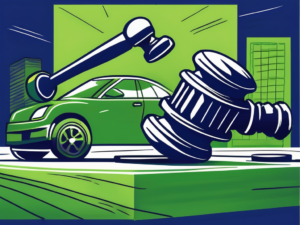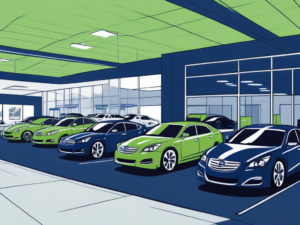Talk to Sales: (401) 200-6026

Car dealerships face a fierce competition in the automotive industry, where the ability to effectively market their vehicles can make all the difference. In today’s digital age, the role of marketing has become increasingly important in driving sales and establishing a strong brand presence. This article will delve into various marketing tactics that can help car dealerships boost their sales and stay ahead in the game.
Understanding the Importance of Car Dealership Marketing
Before delving into the specific tactics, it is crucial to understand the significance of marketing in the car sales industry. Marketing plays a central role in creating awareness, generating leads, and ultimately converting those leads into actual sales. In a crowded marketplace, it is essential for car dealerships to stand out and capture the attention of potential buyers.
Car dealership marketing goes beyond simply advertising a car for sale. It involves a strategic and comprehensive approach to attract and engage customers throughout their buying journey. From the initial research phase to the final purchase decision, effective marketing tactics can make all the difference in a dealership’s success.
One of the primary roles of marketing in car sales is to create a positive perception of the dealership. Through various channels, such as social media, television commercials, and online advertisements, dealerships can showcase their unique selling points and differentiate themselves from competitors. By highlighting their exceptional customer service, extensive inventory, or exclusive deals, dealerships can influence consumer decisions and encourage them to choose their dealership over others.
The Role of Marketing in Car Sales
In the highly competitive landscape of car sales, marketing acts as a catalyst for success. It helps to create a positive perception of the dealership, influence consumer decisions, and drive traffic into the showroom. Marketing not only helps to build brand awareness but also establishes the dealership as a trusted source for reliable vehicles.
Furthermore, marketing plays a crucial role in generating leads. By implementing effective lead generation strategies, such as targeted online advertising campaigns or hosting special events, dealerships can attract potential buyers and gather their contact information. These leads can then be nurtured through personalized follow-ups, providing them with the information and support they need to make a purchase decision.
Moreover, marketing is essential for maintaining customer loyalty and fostering long-term relationships. By consistently engaging with existing customers through newsletters, exclusive offers, or loyalty programs, dealerships can keep their brand top-of-mind and encourage repeat business. Satisfied customers are also more likely to refer friends and family to the dealership, further expanding its customer base.
Why Traditional Marketing Tactics Might Not Be Enough
In the past, traditional marketing tactics such as newspaper advertisements, radio spots, and billboards were effective in reaching a wide audience. However, with the rise of the internet and changing consumer behavior, these tactics alone may not be enough. Today’s car buyers are more tech-savvy and rely heavily on online research before making a purchase decision.
Car dealerships need to adapt their marketing strategies to include both traditional and digital tactics to effectively reach their target audience. A comprehensive and integrated approach is crucial to ensure maximum reach and impact.
With the advent of digital marketing, car dealerships can leverage various online platforms to reach potential buyers. Social media platforms like Facebook and Instagram allow dealerships to target specific demographics and engage with potential customers through visually appealing content and interactive posts. Additionally, search engine optimization (SEO) techniques can help dealerships rank higher in search engine results, making it easier for customers to find them when conducting online research.
Furthermore, online advertising platforms, such as Google Ads or display networks, enable dealerships to reach potential buyers at the exact moment they are searching for a new car. By targeting keywords related to specific makes and models, dealerships can present their inventory to interested buyers and increase the likelihood of conversion.
Additionally, digital marketing allows for more personalized and targeted communication. Through email marketing campaigns, dealerships can send tailored messages to segmented customer groups, providing them with relevant information and exclusive offers. This personalized approach helps to build trust and establish a strong connection with potential buyers.
In conclusion, the role of marketing in car sales cannot be underestimated. It is not just about advertising; it is about creating a positive brand image, generating leads, and fostering long-term customer relationships. By embracing both traditional and digital marketing tactics, car dealerships can effectively reach their target audience and stay ahead in the competitive automotive industry.
Sell cars on the lot faster with AutoRaptor
Know if we’re the right fit within 10 minutes
Building a Strong Online Presence
In this digital era, having a strong online presence is non-negotiable for any business, including car dealerships. The ability to connect with customers and showcase inventory online has become crucial in the competitive automotive industry. Here are some essential tactics for building a robust online presence:
Importance of a User-Friendly Website
A well-designed and user-friendly website is the foundation of any successful online marketing strategy. It serves as the virtual storefront for the dealership, providing potential customers with a glimpse into the offerings and services available. A visually appealing website that is easy to navigate helps create a positive first impression and encourages visitors to explore further.
Furthermore, a mobile-friendly website is essential in today’s mobile-driven world. With more and more people accessing the internet through their smartphones, having a responsive website ensures that potential customers can easily browse inventory, check pricing, and contact the dealership, regardless of the device they are using.
A user-friendly website enhances the customer’s online experience, encourages exploration, and increases the likelihood of them making contact or visiting the physical dealership.
Leveraging Social Media for Car Dealerships
Social media platforms such as Facebook, Instagram, and Twitter offer tremendous opportunities for car dealerships to connect with their target audience on a more personal level. With billions of active users, these platforms allow dealerships to showcase their inventory, engage with potential buyers, and build a community of loyal customers.
By creating engaging content, such as visually appealing images and videos of cars, behind-the-scenes dealership tours, and customer testimonials, car dealerships can capture the attention of their audience and foster a sense of trust and authenticity. Responding to customer queries and comments in a timely manner also helps establish a strong online presence and build customer loyalty.
In addition to organic content, running targeted ad campaigns on social media platforms can significantly increase a dealership’s brand visibility and attract new leads. By utilizing advanced targeting options, such as location, demographics, and interests, car dealerships can ensure that their ads reach the right audience at the right time.
SEO Strategies for Car Dealerships
Implementing effective search engine optimization (SEO) strategies is critical to ensure that the dealership’s website appears at the top of search engine results. When potential customers search for car-related keywords, it is essential for the dealership’s website to be prominently displayed, increasing the chances of attracting organic traffic.
Car dealerships can optimize their website content by incorporating relevant keywords throughout their webpages, including in titles, headings, and descriptions. Creating informative and engaging blog posts about car buying tips, maintenance advice, and industry news can also help improve search engine rankings.
Building high-quality backlinks is another important aspect of SEO for car dealerships. By collaborating with reputable automotive websites, participating in industry forums, and guest blogging on relevant platforms, dealerships can increase their website’s authority and credibility in the eyes of search engines.
Investing in SEO can have a tremendous long-term impact on a dealership’s online visibility and lead generation efforts. By consistently optimizing website content and staying up-to-date with the latest SEO trends, car dealerships can ensure that they remain competitive in the online landscape.
Sell cars on the lot faster with AutoRaptor
Know if we’re the right fit within 10 minutes
Utilizing Offline Marketing Tactics
While online marketing is a must, car dealerships should not overlook the power of offline marketing tactics. These tactics can help reach potential customers outside of the digital realm and create a lasting impression. Here are some effective offline marketing tactics:
Hosting Community Events
Organizing community events can be an excellent way for car dealerships to connect with local residents and build relationships. By hosting car shows, test-drive events, or charity drives, dealerships can showcase their vehicles and engage with potential customers in a relaxed and enjoyable setting.
Community events not only generate buzz and positive word-of-mouth for the dealership but also help to create a sense of community and goodwill.
Collaborations and Partnerships
Collaborating with other businesses or influential individuals can significantly expand a dealership’s reach and attract new customers. Partnering with local businesses, sponsoring sports teams, or working with social media influencers relevant to the target market can help create unique marketing opportunities and increase brand visibility.
Collaborations leverage mutually beneficial relationships and tap into new networks, allowing the dealership to reach potential customers who may have otherwise been out of reach.
Effective Print Advertising
While online marketing dominates the landscape, print advertising can still be a powerful tool for car dealerships. Strategic placement of advertisements in newspapers, magazines, and local publications can help target specific demographics and reach potential customers who may not be actively searching for vehicles online.
Print advertising offers a tangible and visually appealing medium to showcase the dealership’s inventory, promotions, and unique selling points.
Harnessing the Power of Email Marketing
Email marketing remains one of the most effective ways to nurture leads, build relationships with customers, and drive repeat business. Car dealerships can leverage email marketing by following these best practices:
Building a Quality Email List
An email list consisting of engaged and interested subscribers is essential for successful email marketing campaigns. Dealerships can acquire email addresses through website sign-ups, in-store promotions, and online lead generation forms. It is crucial to ensure that subscribers have given their consent to receive marketing communications.
Building a quality email list takes time and effort, but it is a valuable asset for ongoing customer engagement and lead nurturing.
Crafting Effective Email Campaigns
An effective email campaign has compelling subject lines, personalized content, and clear calls to action. Car dealerships can send newsletters, exclusive offers, and personalized recommendations based on the customer’s previous interactions and interests.
By delivering relevant and timely content, car dealerships can nurture leads, drive traffic to the website, and ultimately increase sales and customer loyalty.
Implementing Customer Relationship Management (CRM)
Implementing a customer relationship management (CRM) system is vital for car dealerships to streamline their marketing efforts and provide exceptional customer service. Here are some benefits of a CRM system:
Understanding CRM in Car Dealership
A CRM system allows car dealerships to centralize customer data, track customer interactions, and streamline marketing campaigns. It provides insights into customer behavior and preferences, allowing dealerships to tailor their marketing efforts accordingly.
By using a CRM system, sales and marketing teams can collaborate more effectively, resulting in improved lead management and higher conversion rates.
Benefits of a CRM System
Implementing a CRM system can lead to enhanced customer satisfaction, increased customer retention, and improved overall efficiency of the dealership’s operations. It allows for personalized customer interactions, targeted marketing campaigns, and proactive customer service.
A CRM system helps car dealerships build long-lasting relationships with customers, drive repeat business, and ultimately boost sales.
In conclusion, car dealership marketing tactics have evolved significantly as consumers increasingly turn to digital channels for their research and purchasing decisions. By building a strong online presence, utilizing offline marketing tactics, harnessing the power of email marketing, and implementing a customer relationship management system, car dealerships can effectively boost their sales, attract new customers, and stay ahead of the competition.
Want to improve your sales and move cars off the lot faster? Book a test drive with AutoRaptor to see how our simple dealership CRM software can help you close more deals effectively.
Subscribe to our Newsletter
Resources to help your dealership convert more leads into sales, retain more customers, and market inventory smarter, straight to your inbox every Sunday.




